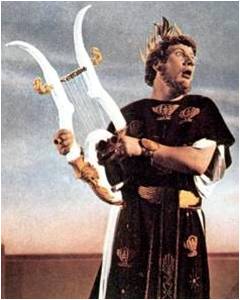 “Oh, men of Athens, what a vile monster is the calumniator, gathering malice from everywhere, always backbiting! But this fellow is by very nature a spiteful animal, absolutely incapable of honesty or generosity; this monkey of melodrama, this bumpkin tragedy-king, this pinchbeck orator!” Thus spoke the famous Greek orator Demosthenes, facing his rival Aeschines at court. The eloquent Athenian pulled all the stops, accusing his opponent of slander, scandalous living and, above all, betraying his country to the Macedonian conqueror Philip II.
“Oh, men of Athens, what a vile monster is the calumniator, gathering malice from everywhere, always backbiting! But this fellow is by very nature a spiteful animal, absolutely incapable of honesty or generosity; this monkey of melodrama, this bumpkin tragedy-king, this pinchbeck orator!” Thus spoke the famous Greek orator Demosthenes, facing his rival Aeschines at court. The eloquent Athenian pulled all the stops, accusing his opponent of slander, scandalous living and, above all, betraying his country to the Macedonian conqueror Philip II.
At stake was not money or power, but honour: Aeschines sought to deny Demosthenes the golden crown with which the Athenians wanted to reward his services to the state. However, Demosthenes triumphed and Aeschines was fined, going into exile to lick his wounds.
Literature
• Edward M. Harris, Aeschines and Athenian Politics (Oxford 1995)
• John Buckler, ‘Demosthenes and Aeschines’, in: Ian Worthington (ed.), Demosthenes: Statesman and Orator (London 2000) 114-158
• Harvey Yunis (ed.), Demosthenes, On the Crown (Cambridge 2001)
• Douglas M. MacDowell, Demosthenes the Orator (Oxford – New York 2009)




 Ambitious, talented and handsome, the general and politician Alcibiades was a striking figure in fifth-century-BC Athens. He played a key role in the Peloponnesian War (431-404 BC) between his home town and its long-standing rival, Sparta. Alcibiades’s anti-Spartan agenda led to fierce political disagreements with some of his fellow citizens. In 415 BC, when he was about to set out on a military expedition to Sicily, his opponents accused him of sacrilege, holding him responsible for the mutilation of statues of the messenger god Hermes.
Ambitious, talented and handsome, the general and politician Alcibiades was a striking figure in fifth-century-BC Athens. He played a key role in the Peloponnesian War (431-404 BC) between his home town and its long-standing rival, Sparta. Alcibiades’s anti-Spartan agenda led to fierce political disagreements with some of his fellow citizens. In 415 BC, when he was about to set out on a military expedition to Sicily, his opponents accused him of sacrilege, holding him responsible for the mutilation of statues of the messenger god Hermes.

